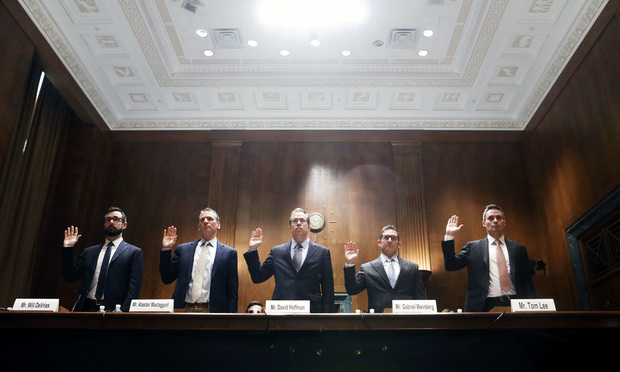Privacy Notices, Opt-In Clauses Debated as US Regulators Shape Federal Privacy Law
Tech giants' privacy counsel and U.S. senators discussed opt-in policies, lengthy, legalese-filled privacy notices and location tracking at a hearing Tuesday morning. The discussion aimed to further shape a potential U.S. federal data privacy law, which could preempt the California Consumer Privacy Act.
March 12, 2019 at 04:15 PM
6 minute read
 Will DeVries, senior privacy counsel with Google, Inc. (from left); Alastair Mactaggart, chairman of Californians for Consumer Privacy; David Hoffman, director of security policy and global privacy officer with Intel; Gabriel Weinberg, CEO and founder of DuckDuckGop; and Tom Lee, policy lead with Mapbox, testify before the Senate Judiciary Committee during the GDPR & CCPA: Opt-ins, Consumer Control, and the Impact on Competition and Innovation hearing Tuesday. (Photo: Diego M. Radzinschi/ALM)
Will DeVries, senior privacy counsel with Google, Inc. (from left); Alastair Mactaggart, chairman of Californians for Consumer Privacy; David Hoffman, director of security policy and global privacy officer with Intel; Gabriel Weinberg, CEO and founder of DuckDuckGop; and Tom Lee, policy lead with Mapbox, testify before the Senate Judiciary Committee during the GDPR & CCPA: Opt-ins, Consumer Control, and the Impact on Competition and Innovation hearing Tuesday. (Photo: Diego M. Radzinschi/ALM)
Tech privacy counsel convened in Washington, D.C.. Tuesday morning for a panel on data privacy laws and consumer control at a Senate Judiciary Committee hearing.
Google, Intel and other company representatives and privacy advocates served as panelists for the GDPR & CCPA: Opt-ins, Consumer Control, and the Impact on Competition and Innovation hearing, which analyzed data protection laws in California and the European Union and further shaped a looming U.S. federal privacy law.
Senators and panelists debated the merits of opt-in, consent-focused data protection laws, such as the EU's General Data Protection Regulation vs. opt-out policies, as found in the California Consumer Privacy Act.
“The way one would know that they're protected is they have to be able to opt in as opposed to opt out. And I'm really concerned about that, California is opt-out,” said Sen. Dianne Feinstein, D-Calif. “Europe is opt-in. So you've got an opt-in standard if you're a country that it's relevant to, in at least 28 countries.”
Panelist Alastair Mactaggart, chairman of the Californians for Consumer Privacy, who helped draft the CCPA, argued that opt-in requirements can cause “click fatigue” for consumers and drive users to mindlessly click “yes” on privacy notices because they feel it's the only way to access a service they need.
He and other panelists, including Mapbox policy lead Tom Lee, advocated for an opt-out feature accessible in web browsers, which would allow consumers to select a one-time button that would remove them from certain data collection processes.
“Opt-in doesn't escape the problem of mountains of fine print. … It standardizes the language to some extent, but it still puts the burden of making that decision, parsing these legal agreements on each individual user,” Lee said. “While opt-in might be appropriate in some circumstances where there's particularly sensitive data between the entities, opt-out with rules of the road that make sense is a better user experience and probably a better way to go.”
Opt-in requirements flood users with lengthy, legalese-filled privacy policies, critics of the policy feature said. Sen. Dick Durbin, D-Illinois, and Sen. John Kennedy, R-Louisiana, both pointed at the length and unclear language of sites' privacy notices and consent forms as a threat to consumers.
 Will DeVries
Will DeVriesDurbin said “no one reads privacy notices,” adding the burden should be on tech companies to ensure consumers are adequately informed on what they're consenting to. Kennedy questioned Google senior privacy counsel Will DeVries on the company's lengthy terms of use, which he said stretches on for more than five pages.
“You could hide a dead body in there; no one would find it, ” Kennedy said.
He wasn't the only senator who used the hearing to grill Google. Sen. Josh Hawley, R-Missouri, questioned DeVries on the Mountain View, California-based company's location tracking policies.
Hawley, the former attorney general of Missouri, claimed Google collected location history from Android phone users, even when location data services were turned off, something he said is not clearly communicated to consumers.
“ So the consumer cannot meaningfully opt out,” Hawley said.
Google, according to DeVries, only uses data from opted-out users if the information is necessary for the phone's basic functions.
As in previous hearings on a potential federal data privacy law, the topic of preemption arose. Panelists said they would support preemption in a federal law, though many noted they would only back it if California's CCPA standards were used as “the floor” for protection, not the ceiling. Feinstein said she would “not support any federal privacy bill that weakens the California standard.”
 David Hoffman
David HoffmanTech companies have pushed for federal preemption, in part, as a way to override California's law, which goes into effect next year. Critics have called the bill too punitive and claimed it doesn't provide a clear enough definition of personal data. Other proponents for a federal privacy law have cited the challenges of a growing number of state-level proposed privacy bills.
“The patchwork of state legislation will create significant new barriers to the innovative use of data. Only large law firms benefit from this use of data, because business owners of all sizes will need lawyers to offer products and services nationwide,” said David Hoffman, the associate general counsel and global privacy officer of Intel Corp. “These legal costs will slow small, innovative data-oriented startups.”
Correction: An earlier version misstated David Hoffman's title as director of security policy and global privacy officer of Intel. He is associate general counsel and global privacy officer.
Read More:
Dazed and Confused: Gray Areas in the Golden State's New Privacy Law
Tech Representatives, Senators Discuss Framework for US Federal Data Privacy Law
This content has been archived. It is available through our partners, LexisNexis® and Bloomberg Law.
To view this content, please continue to their sites.
Not a Lexis Subscriber?
Subscribe Now
Not a Bloomberg Law Subscriber?
Subscribe Now
NOT FOR REPRINT
© 2025 ALM Global, LLC, All Rights Reserved. Request academic re-use from www.copyright.com. All other uses, submit a request to [email protected]. For more information visit Asset & Logo Licensing.
You Might Like
View All
How Marsh McLennan's Small But Mighty Legal Innovation Team Builds Solutions That Bring Joy

Aggressive FTC May Force Merging Companies to Bolster Legal Defenses
4 minute read
Best Legal Departments: How Blackstone's Legal and Compliance Team Got the All-Clear to Grow Business

CEOs Want Data-Based Risk Management; GCs Lack the Tech to Do So.
Trending Stories
Who Got The Work
J. Brugh Lower of Gibbons has entered an appearance for industrial equipment supplier Devco Corporation in a pending trademark infringement lawsuit. The suit, accusing the defendant of selling knock-off Graco products, was filed Dec. 18 in New Jersey District Court by Rivkin Radler on behalf of Graco Inc. and Graco Minnesota. The case, assigned to U.S. District Judge Zahid N. Quraishi, is 3:24-cv-11294, Graco Inc. et al v. Devco Corporation.
Who Got The Work
Rebecca Maller-Stein and Kent A. Yalowitz of Arnold & Porter Kaye Scholer have entered their appearances for Hanaco Venture Capital and its executives, Lior Prosor and David Frankel, in a pending securities lawsuit. The action, filed on Dec. 24 in New York Southern District Court by Zell, Aron & Co. on behalf of Goldeneye Advisors, accuses the defendants of negligently and fraudulently managing the plaintiff's $1 million investment. The case, assigned to U.S. District Judge Vernon S. Broderick, is 1:24-cv-09918, Goldeneye Advisors, LLC v. Hanaco Venture Capital, Ltd. et al.
Who Got The Work
Attorneys from A&O Shearman has stepped in as defense counsel for Toronto-Dominion Bank and other defendants in a pending securities class action. The suit, filed Dec. 11 in New York Southern District Court by Bleichmar Fonti & Auld, accuses the defendants of concealing the bank's 'pervasive' deficiencies in regards to its compliance with the Bank Secrecy Act and the quality of its anti-money laundering controls. The case, assigned to U.S. District Judge Arun Subramanian, is 1:24-cv-09445, Gonzalez v. The Toronto-Dominion Bank et al.
Who Got The Work
Crown Castle International, a Pennsylvania company providing shared communications infrastructure, has turned to Luke D. Wolf of Gordon Rees Scully Mansukhani to fend off a pending breach-of-contract lawsuit. The court action, filed Nov. 25 in Michigan Eastern District Court by Hooper Hathaway PC on behalf of The Town Residences LLC, accuses Crown Castle of failing to transfer approximately $30,000 in utility payments from T-Mobile in breach of a roof-top lease and assignment agreement. The case, assigned to U.S. District Judge Susan K. Declercq, is 2:24-cv-13131, The Town Residences LLC v. T-Mobile US, Inc. et al.
Who Got The Work
Wilfred P. Coronato and Daniel M. Schwartz of McCarter & English have stepped in as defense counsel to Electrolux Home Products Inc. in a pending product liability lawsuit. The court action, filed Nov. 26 in New York Eastern District Court by Poulos Lopiccolo PC and Nagel Rice LLP on behalf of David Stern, alleges that the defendant's refrigerators’ drawers and shelving repeatedly break and fall apart within months after purchase. The case, assigned to U.S. District Judge Joan M. Azrack, is 2:24-cv-08204, Stern v. Electrolux Home Products, Inc.
Featured Firms
Law Offices of Gary Martin Hays & Associates, P.C.
(470) 294-1674
Law Offices of Mark E. Salomone
(857) 444-6468
Smith & Hassler
(713) 739-1250






